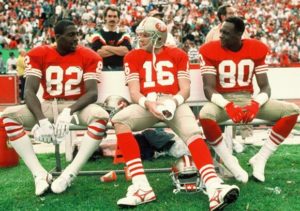Drew Brees and Philip Rivers are two of the best quarterbacks of the last dozen years. Brees joined the Saints in 2006, paving the way for Rivers to become the Chargers starting quarterback that season. Since then, they are the only two players who threw for 50,000 yards from 2006 to 2017, and they have been just a hair behind Tom Brady, Aaron Rodgers, and Peyton Manning in terms of efficiency.
But despite over a decade of great play, neither Brees nor Rivers have won the AP MVP award. The main reason? The triumvirate of Manning, Brady, and Rodgers have won 8 of the 12 AP MVP awards from ’06 to ’17. In the other years, the award went to Matt Ryan in 2016, Cam Newton in 2015, and running backs Adrian Peterson in 2012 and LaDainian Tomlinson in 2006. In 2012, if Peterson didn’t win the award, Manning would have won it (Peterson beat Manning 30.5 votes to 19.5 votes, and Manning lapped the field for the AP All-Pro QB vote), so neither Brees not Rivers were denied that season.
But in 2006, it probably would have gone to Brees, it not for the historic year that Tomlinson had. Brees was the AP first-team All-Pro choice at QB, largely because of how he transformed the Saints offense from one of the worst to one of the best in a single offseason. Tomlinson ran away with the vote, capturing 44 of 50 votes, but Brees was the runner-up with 4 votes to Manning’s two. That said, I’m not sure I feel particularly bad for Brees on this point: advanced statistics point to Manning as having been the best quarterback that year, and by a decent margin. The ’06 Colts were historically great at picking up first downs, Manning led in ANY/A, and Manning lapped the field in Total QBR. Brees would have won the award based on factors other than pure merit, had it not been for Tomlinson’s performance.
Still, it’s hard not to feel bad for these teammates on the ’04 and ’05 Chargers. For the last 12 years, Brees and Rivers have been behind Manning/Brady/Rodgers in 10 of 12 years, and also behind historically great single seasons from Brees’s NFC South rivals. I went ahead and calculated how many Adjusted Net Yards each quarterback has provided, relative to league average, for each season since 2006. The formula is simple. In 2009, for example, Brees averaged 8.31 ANY/A (Adjusted Net Yards/Attempt, of course, is yards per attempt, with a 45-yard penalty for interceptions, deductions for sacks, and a 20-yard bonus for touchdown passes) and Rivers averaged 8.30 ANY/A, while the league average that season was 5.65. Brees had 534 dropbacks, so he is credited with 1,422 Adjusted Net Yards of value added over average (8.31 – 5.65, multiplied by 534). Rivers had 511 dropbacks, so he is credited with 1,356 ANY of value added over average.
In both 2008 and 2009, Brees and Rivers ranked 1st and 2nd in value added over average. In ’08, both the Saints and Chargers finished 8-8; Manning, who led the NFL with 6 game-winning drives, won the AP MVP on the 12-4 Colts. In ’09, Manning’s Colts began the year 14-0 before shutting things down for the season; Manning was always a shoe-in for that award, thanks to a whopping 7 fourth quarter comebacks in those 14 games; no other quarterback had more than 3 that season. But in terms of ANY/A (and Value), Rivers and Brees were better choices than Manning both years.
In addition, Brees had three seasons where he ranked 2nd in value (’06, ’11, ’17) and two more where he ranked 3rd (’12, ’13). Rivers had a third 2nd-place finish in value in 2010 (behind MVP Brady), and also had a 3rd (2017), 4th (2013), and 5th (2006) place finish.
This year, both players are having remarkable seasons, but Rivers ranks 3rd in Value and Brees ranks 6th in Value. Yes, it looks like Patrick Mahomes or Jared Goff or even Todd Gurley could be what stops Brees and Rivers from that elusive first AP MVP Award.
The graph below shows Brees, Rivers, and the leader in Adjusted Net Yards over average for each year since 2006. The NFL leader is in red; Rivers is in Chargers colors, and Brees is in Saints colors. Both Rivers and Brees have had a lot of great seasons, but seasons that fall just shy of MVP-level great.

Rivers and Brees both were victims of Manning in ’08 and ’09, but the biggest snake eyes either of them rolled was in 2011. That year, Rodgers had his best season and was historically great — the only better seasons since ’06, by value, were Manning ’13 and Brady ’07. But Brees 2011 was also great — in fact, it’s the 5th-best season since ’06, with Ryan ’16 being the only other season ahead of him. It just so happens that Brees picked a bad time to have a career season.

